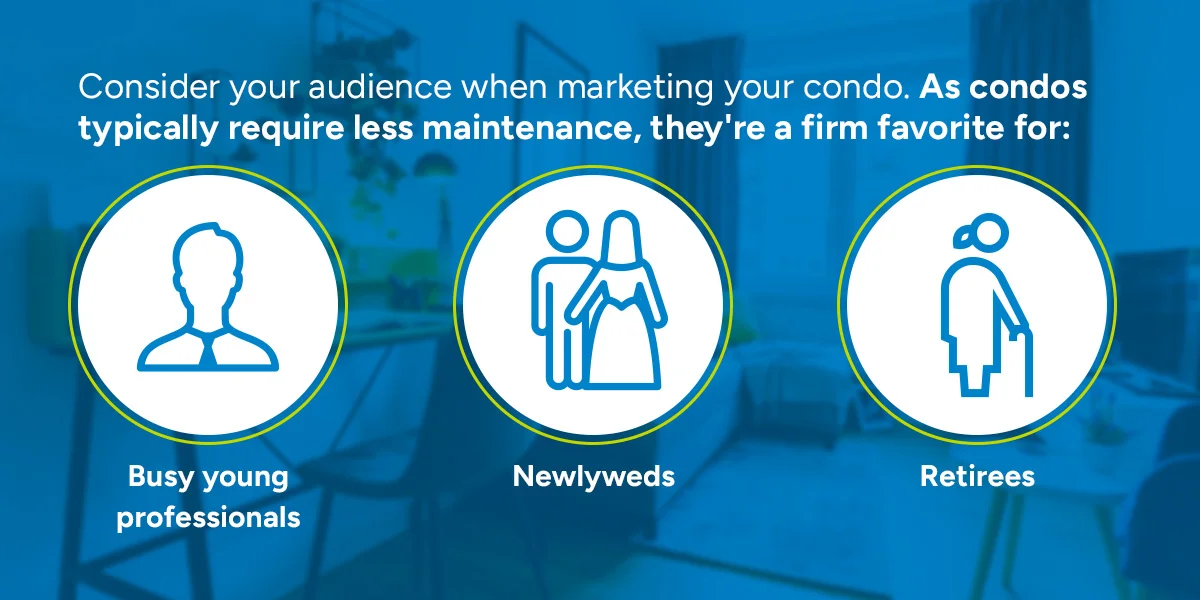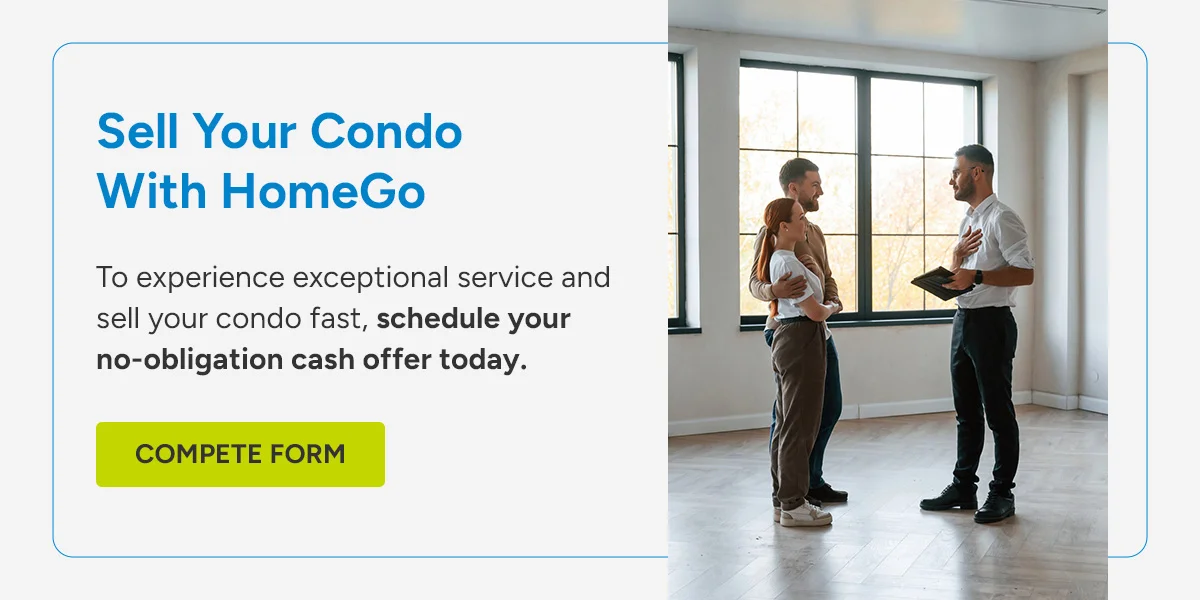If you’re considering a condo sale, you’ve probably Googled “how to sell my condo” at least a dozen times. After all, taking the time to uncover some helpful tips can help you sell your property quickly and for the price you deserve. The good news is that even in a down market, selling a condo is a different — and faster — process than selling a single-family home.
Why? Because condos are usually smaller, less expensive and have lower maintenance costs, all of which potential buyers value. However, marketing a condo requires a different approach, so ditch the “for sale” signs and learn how these 10 tips for selling your condo can help.
1. Understand HOA/Condo Association Requirements
Homeowners or condo associations typically manage condos. When it comes to marketing and selling, each association has its own rules, often including who you can — and can’t — sell to. Check with the relevant HOA first, as buyers may have a contingency in the contract allowing them to back out over HOA rules.
Save time and frustration by learning the rules and being upfront with potential buyers about any association’s pros and cons. In addition, it’s good practice to alert potential buyers of monthly or annual fees so they can factor them into their budget.
2. Sell at the Right Time
Homes generally sell faster in the warmer seasons, but condos don’t always comply with these trends. The good weather makes it easier for sellers to enhance their curb appeal, helping attract new families to the neighborhood. Moving in over the summer also means there are no disruptions to the school schedule.
However, condo buyers tend to be single, retired or a newly married couple, so they don’t need to plan their move around school schedules. Another factor to consider is that many condos don’t have yards, eliminating the need for seasonal landscaping. If your condo is in a tourist destination with lots of vacation rentals, consider listing it ahead of high-traffic periods. For example, a condo near a ski resort, beach or lake is likely to attract more interest ahead of the winter or summer seasons, respectively.
3. Set the Right Price
Are you wondering how to sell your condo quickly? The right price is key. While, of course, you want to get the most money for your condo, pricing too high — even if just in an attempt to leave negotiating room — may discourage offers. Plus, the longer a condo is on the market, the lower the value drops.
Use neighboring units to find comp sales, and keep in mind that small differences affect value. For example, many buyers consider a condo in the middle of a thoroughfare as less private and, therefore, less valuable. On the other hand, a condo with a beautiful view or state-of-the-art fixtures will command a higher price. The colors of the walls may even influence buyer offers. Implementing the latest color trends will help your condo appear more modern and appealing.
4. Consider Buyer Demographics

Consider your audience when marketing your condo. As condos typically require less maintenance, they’re a firm favorite for busy young professionals, newlyweds and retirees. Tourists often seek a low-maintenance vacation home in a highly trafficked area. In contrast, families with kids usually want more space than most condos offer.
5. Stage to Sell
Let’s be honest — condos often follow a more generic style compared to residential homes. There may also be similar units available in the same complex when you put your condo on the market. In light of this, you need to make your space stand out.
The staging process has various steps, from decluttering and cleaning to neutralizing your decor. The ultimate goal is for potential buyers to imagine what it’s like to open the front door, cook dinner in the kitchen and seek comfort in the living room. And it works — approximately 81% of home buyers’ agents say this tactic helps potential homeowners visualize themselves in the space. Pay close attention to detail by filling every nail hole, scrubbing every grout line, fixing every squeaky door hinge and making every surface sparkle.
6. Develop a Marketing Strategy
Selling a condo involves more than a “for sale” sign and flyers — in fact, many HOAs don’t allow these traditional marketing tactics. Instead, focus on the features of the complex and the community.
Once you’ve staged your condo, take high-quality photos that highlight your unit’s unique features and the complex’s amenities. Any marketing plan must contain digital elements, as 52% of homeowners found their current home online.
Research which platforms your target audience uses so your advertising efforts yield effective results. For example, newlyweds will likely be younger and more competent with social media. On the other hand, some retirees may prefer to learn about your condo sale through printed ads.
7. Pass on the Open House
Open houses require significant time and effort, but they may not be effective when selling a condo. People who attend aren’t necessarily serious buyers, but those with a real interest will ask for a showing. Plus, open houses aren’t likely to get foot traffic in a condo complex. Because many HOAs dictate who can and can’t buy, an open house often doesn’t make sense.
Instead, focus your efforts on preparing your condo for showings. That way, you can accommodate appointments made with minimal notice.
8. Prepare for a Home Inspection
As with residential homes, most buyers will request their own inspection of the condo. However, organizing a pre-listing inspection may ignite potential buyers’ interest and simplify the selling process.
Before listing your condo, make any necessary repairs so you can price it accurately. Be realistic with your time and budget when considering which elements of your condo do and don’t need repairs. You can then prioritize your condo improvements accordingly to get the best return on your maintenance investments.
After all, many transactions fall through during the inspection process — a pre-inspection can prevent unpleasant surprises.
9. Work With a Real Estate Attorney
Some states require a real estate attorney to facilitate the closing process. Even if it’s not required by law, hiring a real estate attorney will help protect your interests.
Working with an attorney experienced in closing condo sales provides a level of expertise beyond that of a real estate agent. Attorneys can help with contract creation, title review, contingencies, tax benefits, identifying red flags and more.
10. Consider Investors
Selling to an investor who wishes to use the condo as a rental or vacation property or a cash buyer looking to flip the property offers numerous benefits. Often, you won’t need to list or market your condo or worry about repairs or upgrades.
Best of all, the sale process is usually much faster. HomeGo purchases properties as-is, so you can sell quickly without worrying about repairs, staging or home inspections. HomeGo also covers all closing costs, saving you money, time and stress.
Sell Your Condo With HomeGo
If you’ve been wondering how to sell your own condo, these tips are sure to help. However, if you’d like some expert assistance with finding a promising buyer for your unit, the HomeGo team is your solution.
Our real estate agents are located around the United States, giving you in-person support where you need it. We also pride ourselves on offering simple and fast service — in fact, our team purchases a home roughly every 20 minutes! To experience exceptional service and sell your condo fast, schedule your no-obligation cash offer today.





